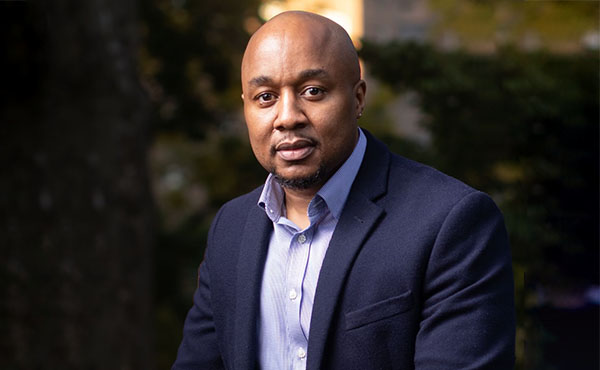The Dolan School of Business (DSB) Event Hall echoed with applause as Don C. Sawyer III, Ph.D. approached the podium to address attendees of the Black Student Union (BSU) Gala on Saturday, Feb. 25.
Sawyer’s steps were supported by his signature pair of Air Jordans. Although, his flair for stylish sneakers was not the mainstay of his presentation. Rather, Sawyer captivated his audience by painting an image of his urban upbringing.
“I’m from a small village,” he began. “I’m from Harlem before Whole Foods.”
He traced the roots that enabled him to assume his role as Fairfield’s Vice President of Diversity, Inclusion and Belonging. Sawyer acknowledged the grittiness of his setting, as he grew up during a tumultuous period of New York City’s history.
“Statistically speaking, I’m not supposed to be standing here before you,” he reflected. “The path that was charted out for a young Black boy living in New York City in the housing projects during the height of the crack cocaine epidemic was not supposed to [lead me to] be here with this audience.”
He tied the past to his present, in which he teaches a weekly “Sociology of Hip Hop” course at the MacDougall-Walker Correctional Institution in Suffield, CT. After stating the jarring sum of his students’ combined prison sentences, he recognized the possibility of a role reversal. He underscored that, if the people had not viewed him “through a lens of possibility,” he may have found himself imprisoned and in the seat of his pupils.
Sawyer’s supportive network fueled his pursuit of a greater purpose. He entered the realm of higher education, receiving a Bachelor of Arts in Psychology at Hartwick College and a Ph.D. in Sociology at Syracuse University.
In an interview with The Mirror, Sawyer meditated on the unique relationship he developed with his roommate at Hartwick.
“We were political opposites,” he admitted. “I’m this Black man from Harlem and he’s a white man from Manchester, CT. But, we created a space to ask questions and debate because we believed we would grow from it.”
By engaging in difficult dialogue as an undergraduate, Sawyer learned to coexist and navigate interactions with individuals with differing worldviews. These experiences shape his understanding of collegiate culture. At Fairfield, Sawyer hopes to guide students to have necessary conversations that will challenge their assumptions.
“I want to be able to produce graduates who are going to be able to go into the world and have an impact because they have experiences that have been shaped by interactions with people from all walks of life,” he explained. “Those are the people who are going to be successful when they leave here. When you go out into the field, everyone is not going to look like us or believe the same things that we believe and that’s fine. We have to know how to interact in those spaces.”
Sawyer will inaugurate his position at Fairfield, which includes serving as chair of the President’s Working Group on Diversity and Inclusive Excellence. Beginning in July, he has been on a “listening tour” on campus.
To acclimate himself to his new environment, Sawyer is fostering relationships with students, faculty and staff. In this year of collaboration and growth, he has identified the connection between the pillars of diversity, inclusion and belonging with the overarching Jesuit mission. He recognizes the necessity of connecting with individuals of every background.
“When people hear terms like ‘DEI’ or ‘social justice,’ there’s an assumption that the role is there just for students of color and people from underrepresented populations,” he noted. “But, the role is more universal.”
Previously, Sawyer held a similar title as the Vice President for Equity, Inclusion, and Leadership Development at Quinnipiac University. The newness of his role at Fairfield enables him to have a sense of freedom as he works to fulfill needs specific to the institution.
“I need to respect what was done in the past and honor the work that was done,” Sawyer asserted. “But, I’m charged with setting the landscape and the path forward for the institution as we think about the future.”
As a formal introduction, he will be hosting a Town Hall on Wednesday, Feb. 28 with 220 faculty members. The location of the event had to be changed due to the large number of registrants, an optimistic sign that the community is ready to embrace Sawyer’s presence on campus.
“As an institution of higher education, this is the place where we’re supposed to be learning and moving and growing,” he declared. “We’re going to make mistakes. But, how do we respond to those mistakes? And how do we help people grow?”
Sawyer reiterated the necessity of addressing issues as a University, particularly in light of recent acts of discrimination nationally and at the local level.
“We know that racism exists. We know that homophobia exists. We know that sexism exists,” he stated. “As an institution, we are not immune to those things. We can’t avoid it. We can’t prevent it. But, we have to respond to it. We don’t want people to be harmed or their humanity to be questioned.”
As he continues to build his legacy at Fairfield, Sawyer’s primary goal is to amplify students’ voices and break the barriers built by ignorance. He is prepared to make strides in the right direction, driven by determination and equipped with a fresh set of Nikes.


Leave a Reply